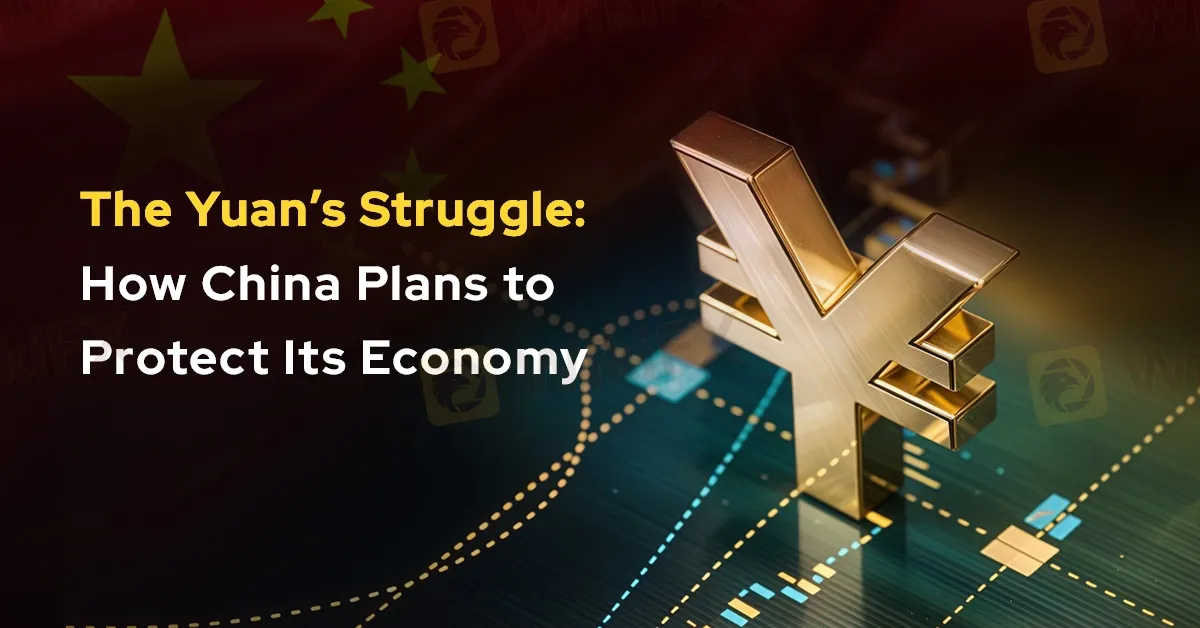简体中文
繁體中文
English
Pусский
日本語
ภาษาไทย
Tiếng Việt
Bahasa Indonesia
Español
हिन्दी
Filippiiniläinen
Français
Deutsch
Português
Türkçe
한국어
العربية
The Yuan’s Struggle: How China Plans to Protect Its Economy
Abstract:China introduced new measures on Monday to support its weakening currency, the yuan, amidst mounting economic and political pressures. The government announced plans to boost foreign exchange reserves in Hong Kong and ease borrowing restrictions for companies to improve capital flows.

China introduced new measures on Monday to support its weakening currency, the yuan, amidst mounting economic and political pressures. The government announced plans to boost foreign exchange reserves in Hong Kong and ease borrowing restrictions for companies to improve capital flows.
The People's Bank of China (PBOC) has been taking steps since late last year to arrest the yuan‘s decline. These include discouraging speculative trading and attempting to stabilise bond yields. On Monday, the PBOC reiterated its warnings against speculation and increased limits on offshore borrowing for companies. This change aims to encourage a greater influx of foreign exchange into China’s economy.
PBOC Governor Pan Gongsheng spoke at the Asia Financial Forum in Hong Kong, revealing plans to allocate a larger portion of China‘s foreign exchange reserves to Hong Kong. Although specific details were not disclosed, this move aligns with the central bank’s strategy to defend the currency. As of December, Chinas foreign reserves totalled approximately $3.2 trillion, though their exact allocation remains unclear.
Analysts view these measures as a signal that currency stability remains a key priority for the PBOC. Lynn Song, Chief Economist for Greater China at ING, noted that strengthening foreign reserves could provide the central bank with additional tools to stabilise the yuan if market conditions worsen.

The yuan continues to face significant challenges, trading at 7.3318 per dollar on Monday, near a 16-month low. Since the US presidential election in November, the yuan has depreciated by more than 3% against the dollar. Concerns about potential trade tariffs under the incoming Trump administration have exacerbated the pressure on the currency and the broader Chinese economy.
The central bank has been setting its midpoint guidance for the yuan higher than market projections since mid-November, a move interpreted by analysts as an effort to curb its rapid decline. Mondays developments highlight the delicate balance the PBOC must maintain. It is tasked with fostering economic growth through supportive monetary policies while addressing declining bond yields and stabilising the currency in a volatile global environment.
Recent measures also include suspending treasury bond purchases to control falling yields and issuing large amounts of bills in Hong Kong to manage yuan circulation offshore. Hong Kong plays a critical role in the yuans offshore market due to its higher trading activity, including foreign exchange swaps and spot transactions.
Gary Ng, Senior Economist at Natixis, emphasised Hong Kongs importance in supporting the yuan through its robust trading ecosystem and investment opportunities.
Meanwhile, trade data released on Monday provided some optimism. Chinas exports showed growth in December, with imports also recovering. However, the year-end export surge was partly attributed to manufacturers rushing shipments ahead of potential trade risks under the new US administration.

Disclaimer:
The views in this article only represent the author's personal views, and do not constitute investment advice on this platform. This platform does not guarantee the accuracy, completeness and timeliness of the information in the article, and will not be liable for any loss caused by the use of or reliance on the information in the article.
Read more

Never Heard of Dynasty Trade? Here's Why You Should Be Worried
Have you heard this name before? No , it’s time you do because staying unaware could cost you. This platform is currently active in the forex trading and has been linked to several suspicious activities. Even if you’ve never dealt with it directly, there’s a chance it could reach out to you through ads, calls, messages, or social media. That’s why it’s important to know the red flags in advance.

Want to Deposit in the EVM Prime Platform? Stop Before You Lose It ALL
Contemplating forex investments in the EVM Prime platform? Think again! We empathize with those who have been bearing losses after losses with EVM Prime. We don't want you to be its next victim. Read this story that has investor complaints about EVM Prime.

WEEKLY SCAM BROKERS LIST IS OUT! Check it now
If you missed this week's fraud brokers list and are finding it difficult to track them one by one — don’t worry! We’ve brought together all the scam brokers you need to avoid, all in one place. Check this list now to stay alert and protect yourself from fraudulent brokers.

Catch the Latest Update on BotBro & Lavish Chaudhary
BotBro, an AI-based trading platform, became popular in India in 2024—but for negative reasons. Its founder, Lavish Chaudhary, who gained a huge following by promoting it heavily on social media. Since then, he has become well-known, but for many controversies. Let’s know the latest update about Botbro & Lavish Chaudhary.
WikiFX Broker
Latest News
Is Your Forex Strategy Failing? Here’s When to Change
FSMA Warns That Some Firms Operate as Pyramid Schemes
Apex Trader Funding is an Unregulated Firm | You Must Know the Risks
Sigma-One Capital Scam? Investors Say They Can’t Withdraw Funds
Federal Reserve likely to hold interest rates steady despite pressure from Trump. Here's what that means for your money
WEEKLY SCAM BROKERS LIST IS OUT! Check it now
Intel drops 9% as chipmaker's foundry business axes projects, struggles to find customers
Palantir joins list of 20 most valuable U.S. companies, with stock more than doubling in 2025
Textiles to whisky: U.K.–India 'historic' deal is set to boost bilateral trade by over $34 billion a year
Thailand-Cambodia border clashes: Cambodia's economy has more to lose, analysts say
Currency Calculator


